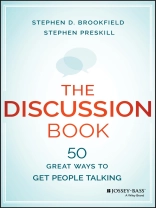Build teams, make better decisions, energize groups, and think out of the box
Do you need a resource that you can pull out of your pocket to liven up meetings, trainings, professional development, and teaching? The fifty easily applied techniques in this timely manual spur creativity, stimulate energy, keep groups focused, and increase participation. Whether you’re teaching classes, facilitating employee training, leading organizational or community meetings, furthering staff and professional development, guiding town halls, or working with congregations, The Discussion Book is your go-to guide for improving any group process.
Each of the concrete techniques and exercises is clearly described with guidance on selection and implementation, as well as advice on which pitfalls to avoid. All of the techniques:
* Offer new ways to engage people and energize groups
* Get employees, students, colleagues, constituents, and community members to participate more fully in deliberative decision-making
* Encourage creativity and openness to new perspectives
* Increase collaboration and build cohesive teams
* Keep groups focused on important topics and hard-to-address issues
Derived from the authors’ decades of experience using these exercises with schools, colleges, corporations, the military, social movements, health care organizations, prisons, unions, non-profits, and elsewhere, The Discussion Book will help you guide discussions that matter.
Spis treści
Preface ix
User Guide xiii
Acknowledgments xix
The Authors xxi
Introduction 1
1 Circle of Voices 9
2 Chalk Talk 13
3 Circular Response 19
4 Newsprint Dialogue 25
5 Today’s Meet 31
6 Giving Appreciation: The Appreciative Pause-Sticky Note Plaudit 37
7 Rotating Stations 43
8 Snowballing 49
9 Conversational Moves 53
10 Critical Incident Questionnaire (CIQ) 59
11 Strategic Questioning 65
12 Open-ended Questions 71
13 Nominating Questions 77
14 If You Could Only Ask One Question 81
15 On-the-Spot Questions and Topics 87
16 What Do You Think? 93
17 Clearness Committee 97
18 Team Modeling 103
19 Question Brainstorm 107
20 Narrative Listening and Questioning 111
21 Participation Rubric 115
22 Critical Conversation Protocol 121
23 What Are You Hearing? 127
24 Understanding Check 131
25 Stand Where You Stand 135
26 Think-Pair-Share 139
27 Drawing Discussion 143
28 Musicalizing Discussion 149
29 Structured Silence 153
30 Writing Discussion 157
31 Quick Writes 161
32 Cocktail Party 165
33 Bohmian Dialogue 169
34 Methodological Belief 173
35 Justifiable Pressure 177
36 Hatful of Quotes 181
37 Quotes to Affirm and Challenge 185
38 Jigsaw 189
39 Titling the Text 193
40 Critical Debate 197
41 Single Word Sum-Ups 201
42 Setting Ground Rules 205
43 Canvassing for Common Ground 209
44 Dramatizing Discussion 215
45 Deliberative Polling 219
46 Participatory Decision Making 223
47 Mutual Invitation 229
48 The Three-Person Rule 233
49 Conversational Roles 237
50 Facilitator Summary 243
Bibliography 247
Index 249
O autorze
STEPHEN D. BROOKFIELD is the John Ireland Endowed Chair at the University of St. Thomas in Minneapolis, Minnesota. He is the author of numerous books including The Skillful Teacher, Teaching for Critical Thinking, and Powerful Techniques for Teaching Adults, from Jossey-Bass.
STEPHEN PRESKILL is professor emeritus at Wagner College in Staten Island, New York. He is the author, with Stephen Brookfield, of Discussion as a Way of Teaching and Learning as a Way of Leading, both from Jossey-Bass.












